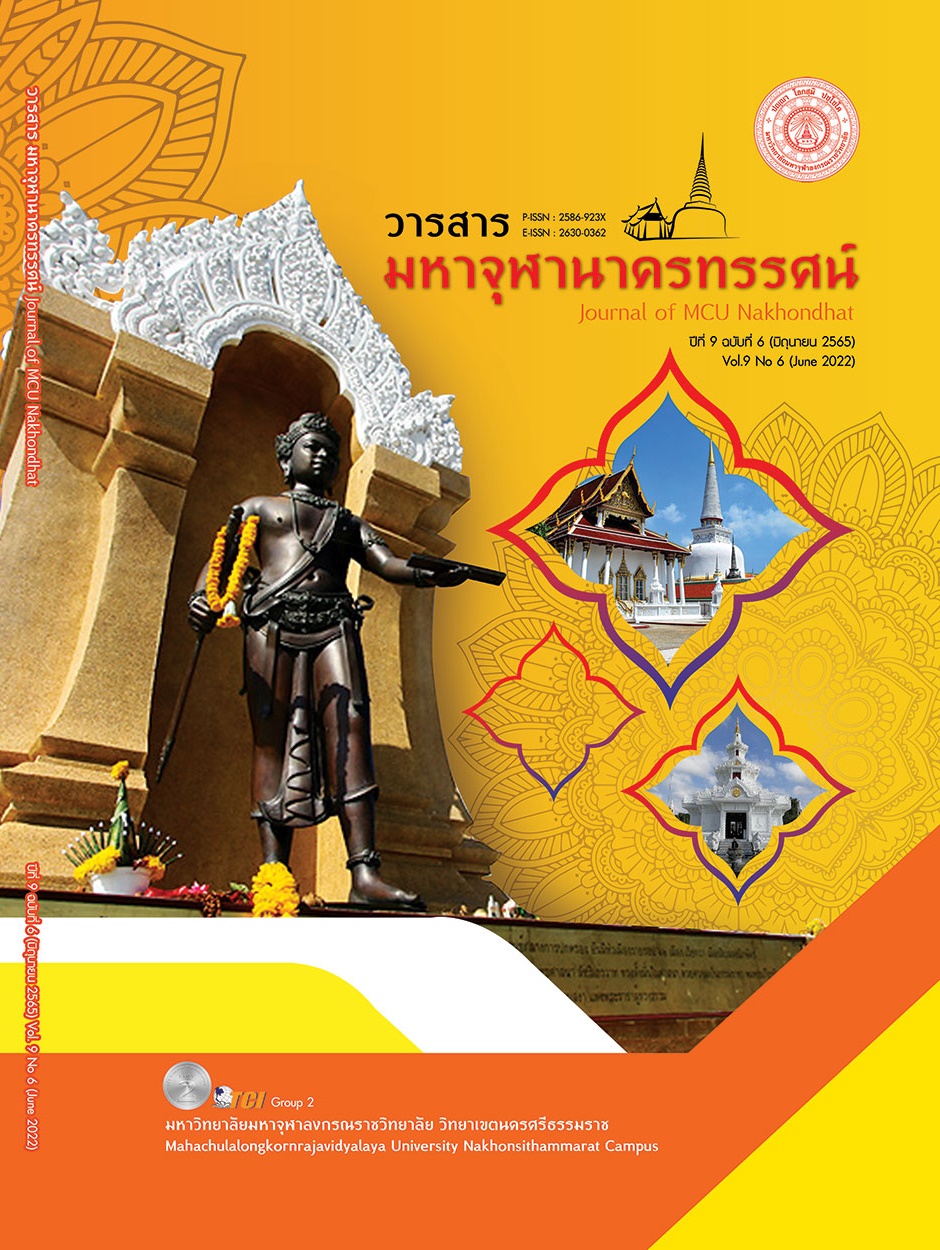BHÃVANÃ 4 DHARMA DOCTRINE AS DHARMA FOR ORGANIZATION DEVELOPMENT AND ENABLING PEOPLE GATHERED A GOOD THINKING AND CAPABILITY
Main Article Content
Abstract
This academic article aims to discuss the principles of Dharma for Organization Development. In which the authors have reviewed relevant documents and analyzed and selected relevant principles in which individuals play important roles in the organization. According to the Dhamma Vijaya. Organization Development, the man was a vital role for changing. Because of the success and failure of the organization depended mainly. The introduction of Buddhist Principles has been still the Bhavana growth: cultivation; training; developing. For Applied to the man developing. Since it has been the principle of Buddhism which has been 4 distinctive features consisted of: 1. Kaya bhãvanã: physical development 2. Sìla bhãvanã: Moral development 3. Citta bhãvanã: cultivation of the heart; emotional development 4. Paññã bhãvanã: cultivation of wisdom; Intersectoral development; wisdom development. The introduction of the Buddhist has the base of man development. Causing the one who has acted according to them so will produce good results for themselves and their colleagues. Including the integration of theoretical concepts of human resource development in Western Education Organizations. Results have been good thinking and capability, there were been as complete person. Both in behavioral, mental and intellectual. Leading the organization proceeded true excellence.
Article Details

This work is licensed under a Creative Commons Attribution-NonCommercial-NoDerivatives 4.0 International License.
References
กาญจนา เงารังสี และคณะ. (2560). การเรียนรู้สู่ประเทศไทย 4.0. กรุงเทพมหานคร: สำนักงานกองทุนสนับสนุนการวิจัย.
ณรงค์วิทย์ แสนทอง. (2560). การพัฒนาคนแนวใหม่. กรุงเทพมหานคร: เอช อาร์ เซ็นเตอร์.
ประเวศน์ มหารัตน์สกุล. (2563). การจัดการทรัพยากรมนุษย์ : แนวทางใหม่. กรุงเทพมหานคร: สำนักพิมพ์ปัญญาชน.
พระพรหมคุณาภรณ์ (ป. อ. ปยุตฺโต). (2559). พจนานุกรมพุทธศาสตร์ ฉบับประมวลธรรม. (พิมพ์ครั้งที่ 34). กรุงเทพมหานคร: มูลนิธิการศึกษาเพื่อสันติภาพ พระธรรมปิฎก (ป.อ.ปยุตฺโต).
พระมหาฉัตรชัย อภิชโยและจักรี ศรีจารุเมธีญาณ. (2564). “การบริหารงานตามแนวหลักพุทธ ธรรม” . วารสารวิชาการรัตนบุศย์, 3 (3) 55-56.
พระมหาภัคศิษฐ์ มหาวิรีโย และพระมหามิตร ฐิตปญฺโญ. (2560). “การพัฒนาคุณภาพชีวิตตามหลักภาวนา 4”. วารสารบัณฑิตศึกษามหาจุฬาขอนแก่น, 4 (1), 42-49.
วนิดา วาดีเจริญ. (2556). การจัดการทรัพยากรมนุษย์ จากแนวคิด ทฤษฎี สู่ภาคปฏิบัติ. กรุงเทพมหานคร: ซีเอ็ดยูเคชั่น.
ศิรินันท์ กิตติสุขสถิต และ คณะฯ. (2555). คู่มือการวัดความสุขด้วยตนเอง. นครปฐม: สถาบันวิจัยประชากรและสังคม มหาวิทยาลัยมหิดล.
สุภาวดี ขุนทองจันทร์. (2559). การบริหารทรัพยากรมนุษย์อย่างบูรณาการ. กรุงเทพมหานคร: ซีเอ็ดยูเคชั่น.
สุมิตร สุวรรณ. (2561). กลยุทธ์การพัฒนา ทรัพยากรมนุษย์และองค์การ. กรุงเทพมหานคร : มหาวิทยาลัยเกษตรศาสตร์.
สุรัชนี เคนสุโพธิ์. (2560). การฝึกอบรม และพัฒนาทรัพยากรมนุษย์. อุดรธานี: คณะวิทยาการจัดการ มหาวิทยาลัยราชภัฎอุดรธานี.


